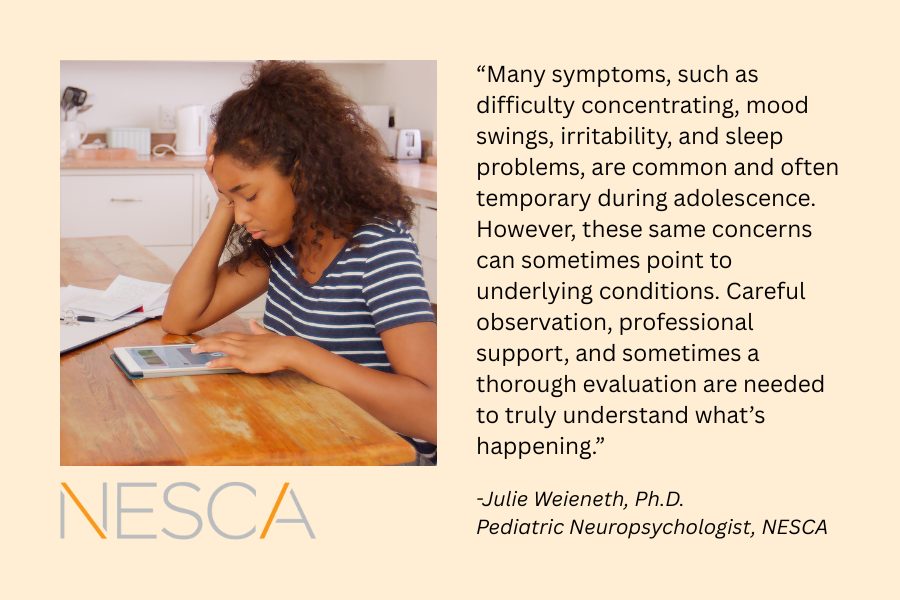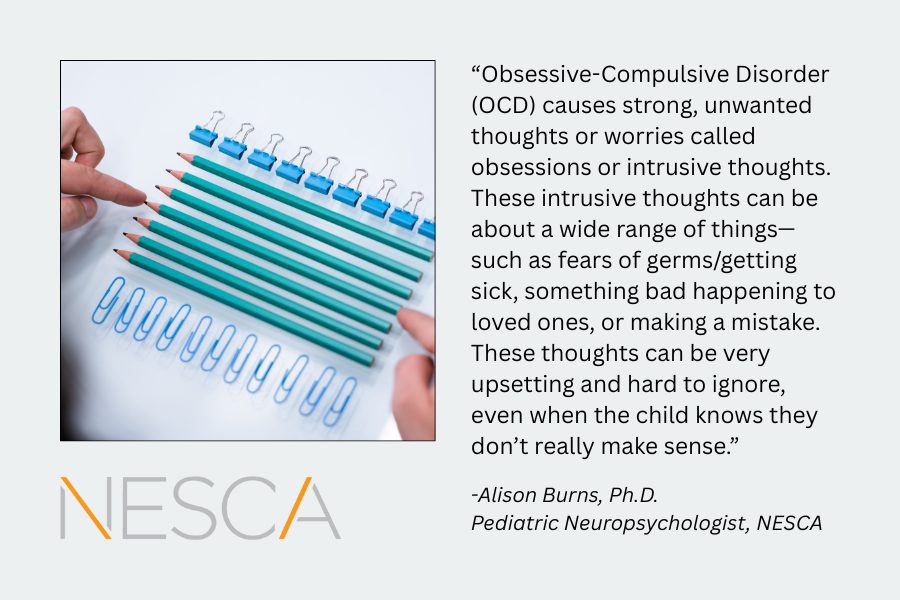
 By: Julie Weieneth, Ph.D.
By: Julie Weieneth, Ph.D.
Pediatric Neuropsychologist, NESCA
Understanding ADHD, Anxiety, Depression, and Typical Adolescent Development
As both a neuropsychologist and a parent, I see firsthand how challenging academic and social pressures can be for teenagers. Like many parents, I sometimes wonder whether my own teen’s struggles are just part of growing up or if they might signal something more serious, such as ADHD, anxiety, or depression. From my clinical perspective, recognizing the difference is crucial. Early intervention not only supports long-term success but can also help prevent more persistent issues in the future.
Why It Can Be Hard to Tell
Many symptoms, such as difficulty concentrating, mood swings, irritability, and sleep problems, are common and often temporary during adolescence. However, these same concerns can sometimes point to underlying conditions. Careful observation, professional support, and sometimes a thorough evaluation are needed to truly understand what’s happening.
Signs of ADHD
- Ongoing struggles with attention, organization, and time management in different settings
- Frequently losing items or forgetting important things
- Trouble staying focused on tasks that require sustained effort
- Restlessness or fidgeting
- Symptoms usually begin in childhood (often by age 12) and are consistent, not just a reaction to stress or specific situations
Signs of Anxiety
- Excessive worry about school, friendships, or the future
- Physical complaints, such as headaches or stomachaches
- Avoidance of stressful situations, including tests or social events
- Perfectionism and fear of making mistakes
- Symptoms often become more noticeable during times of increased stress
Signs of Depression
- Persistent sadness or irritability
- Loss of interest in activities that used to be enjoyable
- Fatigue and low energy
- Changes in sleep or eating habits
- Withdrawal from friends and family
- Symptoms last for two weeks or longer and can significantly affect motivation and daily functioning
Typical Adolescent Challenges
- Occasional procrastination or forgetfulness
- Temporary mood swings or frustration
- Feeling stressed before exams or social events
- Desire for more independence and privacy
- These concerns are usually mild, short-lived, and tend to improve with support, structure, and time
How a Neuropsychological Evaluation Can Help
A neuropsychological assessment can help clarify whether a teen’s symptoms are part of normal development or indicate a clinical concern. This process includes reviewing developmental and academic history, conducting standardized testing, and gathering input from parents, teachers, and the teen.
Ways to Support Teens Based on Their Needs
- For ADHD, strategies such as organizational (Executive Function – EF) coaching, academic accommodations, behavioral therapy, and sometimes medication may be needed
- For anxiety, counseling, stress management techniques, a supportive environment, and sometimes medication may be needed
- For depression, therapy, healthy routines, and sometimes medication can make a significant difference
- For teens experiencing more than one of these concerns, a combination of strategies and coordinated care is often most effective
- For typical adolescent challenges, open communication, structure, and encouragement usually work well
If your teen’s difficulties persist or begin to interfere with everyday life, reaching out to a neuropsychologist can provide clarity and guidance. Early understanding and tailored support can help your teen feel better and succeed both now and in the future. If you are unsure whether your teen needs a full neuropsychological evaluation, you can schedule a consultation with a NESCA clinician who will review your concerns and help you decide how best to proceed.
About the Author
Dr. Weieneth is a licensed clinical psychologist who has worked with children and families with complex diagnostic and treatment needs for the last twenty years. Her areas of specialty include ADHD, autism spectrum disorders, anxiety, mood disorders, learning disabilities, executive functioning, and school-related challenges. That being said, Dr. Weieneth also understands that not all individuals fit cleanly into diagnostic groups or labels. Her goals for each evaluation are to help families feel comfortable with the process, use all the tools available to best understand each individual’s unique strengths and needs, and to write a clear and comprehensive report that will guide educational and treatment planning.
To book a consultation with Dr. Weieneth or one of our many other expert neuropsychologists or other clinicians, complete NESCA’s online intake form.
NESCA is a pediatric neuropsychology and related services practice with offices in Newton, Plainville, and Hingham, Massachusetts; Londonderry, New Hampshire; the greater Burlington, Vermont region; and Coral Gables, Florida, serving clients from infancy through young adulthood and their families. For more information, please email info@nesca-newton.com or call 617-658-9800.

